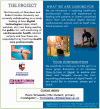"Sometimes I don't have a pulse … and I'm still alive!" Interviews with healthcare professionals to explore their experiences of and views on population-based digital health technologies
- PMID: 34104464
- PMCID: PMC8145583
- DOI: 10.1177/20552076211018366
"Sometimes I don't have a pulse … and I'm still alive!" Interviews with healthcare professionals to explore their experiences of and views on population-based digital health technologies
Abstract
Background: Digital technologies are increasingly becoming an integral part of our daily routine and professional lives, and the healthcare field is no exception. Commercially available digital health technologies (DHTs - e.g. smartphones, smartwatches and apps) may hold significant potential in healthcare upon successful and constructive implementation. Literature on the topic is split between enthusiasm associated with potential benefits and concerns around privacy, reliability and overall effectiveness. However, little is known about what healthcare professionals (HCPs) have experienced so far with patients and what they perceive as the main advantages and disadvantages of adoption. This study therefore aims to investigate current perceptions of HCPs towards self-tracked health-related outputs from devices and apps available to the public.
Methods: Nine HCPs volunteered to take part in semi-structured interviews. Related data were thematically analysed, following a deductive approach with the construction of a framework based on expected themes from the relevant literature, and themes identified from the first two interviews.
Findings: The following main themes in relation to DHTs were identified and explored in detail: HCPs' experience, knowledge and views; advantages and disadvantages; barriers towards healthcare implementation and potential solutions; future directions. While most participants were adopters of DHTs and held positive views about them, their overall experience with patients and the technology was limited. Potential reasons for this were explored, including factors such as time/resources; colleagues' mindset; lack of evidence of effectiveness for practice; data security concerns.
Conclusions: The potential advantages of DHTs' adoption in healthcare are substantial, e.g. patient autonomy, time/resources saving, health and behaviour change promotion, but are presently premature. Therefore, future research is warranted, focussing on addressing barriers, minimising disadvantages, and assessing the clinical value of commercially available DHTs.
Keywords: Digital health; health apps; healthcare professionals; mHealth; qualitative interviews; self-tracking; smartphones; smartwatches; wearables.
© The Author(s) 2021.
Conflict of interest statement
Declaration of conflicting interests: The author(s) declared no potential conflicts of interest with respect to the research, authorship, and/or publication of this article.
Figures
Similar articles
-
Barriers and facilitators to use of digital health tools by healthcare practitioners and their patients, before and during the COVID-19 pandemic: a multimethods study.BMJ Open. 2024 Mar 5;14(3):e080055. doi: 10.1136/bmjopen-2023-080055. BMJ Open. 2024. PMID: 38448080 Free PMC article.
-
Strengths, Weaknesses, Opportunities, and Threats Analysis of the Use of Digital Health Technologies in Primary Health Care in the Sub-Saharan African Region: Qualitative Study.J Med Internet Res. 2023 Sep 7;25:e45224. doi: 10.2196/45224. J Med Internet Res. 2023. PMID: 37676721 Free PMC article.
-
Mental health professionals views and the impact of COVID-19 pandemic on implementing digital mental health in China: A nationwide survey study.Internet Interv. 2022 Sep 24;30:100576. doi: 10.1016/j.invent.2022.100576. eCollection 2022 Dec. Internet Interv. 2022. PMID: 36185346 Free PMC article.
-
Assessing the Value of Provider-Facing Digital Health Technologies Used in Chronic Disease Management: Toward a Value Framework Based on Multistakeholder Perceptions.Med Decis Making. 2024 Jan;44(1):28-41. doi: 10.1177/0272989X231206803. Epub 2023 Oct 26. Med Decis Making. 2024. PMID: 37882333 Free PMC article. Review.
-
Personal barriers to addressing intimate partner abuse: a qualitative meta-synthesis of healthcare practitioners' experiences.BMC Health Serv Res. 2021 Jun 9;21(1):567. doi: 10.1186/s12913-021-06582-2. BMC Health Serv Res. 2021. PMID: 34107941 Free PMC article. Review.
Cited by
-
Healthcare professionals' attitudes towards digital health interventions and perspectives on digital health inequalities in cardiometabolic care: a qualitative study.BMJ Open. 2025 Feb 26;15(2):e091018. doi: 10.1136/bmjopen-2024-091018. BMJ Open. 2025. PMID: 40010817 Free PMC article.
-
Healthcare provider experiences of deploying a continuous remote patient monitoring pilot program during the COVID-19 pandemic: a structured qualitative analysis.Front Digit Health. 2023 Jun 28;5:1157643. doi: 10.3389/fdgth.2023.1157643. eCollection 2023. Front Digit Health. 2023. PMID: 37483317 Free PMC article.
-
What are practitioners' views of how digital health interventions may play a role in online child sexual abuse service delivery?Front Digit Health. 2024 Mar 20;6:1325385. doi: 10.3389/fdgth.2024.1325385. eCollection 2024. Front Digit Health. 2024. PMID: 38572144 Free PMC article.
-
Menopause apps: Personal health tracking, empowerment and epistemic injustice.Digit Health. 2025 Apr 27;11:20552076251330782. doi: 10.1177/20552076251330782. eCollection 2025 Jan-Dec. Digit Health. 2025. PMID: 40297381 Free PMC article.
-
Transitioning Perspectives in Digital Health Through Phenomenology Integration.J Med Internet Res. 2024 Oct 23;26:e62691. doi: 10.2196/62691. J Med Internet Res. 2024. PMID: 39442170 Free PMC article.
References
-
- Crilly P, Hassanali W, Khanna G, et al.. Community pharmacist perceptions of their role and the use of social media and mobile health applications as tools in public health. RSAP 2019; 15: 23–30. - PubMed
-
- Consultancy-UK. UK smartphone penetration continues to rise to 85% of adult population, www.consultancy.uk/news/14113/uk-smartphone-penetration-continues-to-ris... (2017, accessed 07 March 2019).
-
- Liquid State. The rise of mHealth apps: a market snapshot, https://liquid-state.com/mhealth-apps-market-snapshot/ (2018, accessed 15 February 2019).
-
- WHO. WHO guideline: recommendations on digital interventions for health system strengthening, www.who.int/reproductivehealth/publications/digital-interventions-health... (2019, accessed 02 May 2019). - PubMed
LinkOut - more resources
Full Text Sources



